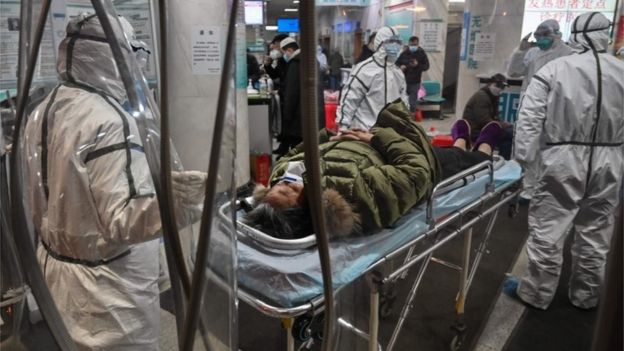(CNN)It's the debate heard 'round the world: Should you or shouldn't you wear a face mask during the coronavirus pandemic?
That's something White House and US Centers for Disease Control and Prevention officials are discussing, according to Dr. Anthony Fauci, the nation's top infectious disease expert.
WHO stands by recommendation to not wear masks if you are not sick or not caring for someone who is sick
WHO stands by recommendation to not wear masks if you are not sick or not caring for someone who is sick
While the World Health Organization on Monday stood by its recommendation only to wear a mask if you are sick or caring for someone who is sick, a growing number of officials and health experts argue that people should wear masks to help prevent spread of the virus.
"We are not going to be wearing masks forever, but it could be for a short period of time after we get back into gear. I could see something like that happening for a period of time," President Trump said during Monday's White House briefing.
The idea of recommending broad use of masks in the United States is under "very active discussion" at the White House, said Fauci, director of the National Institute of Allergy and Infectious Diseases, adding that the White House Task Force will be discussing it Tuesday.
Speaking to CNN's Jim Sciutto, Fauci said on CNN Newsroom that "the idea of getting a much more broad communitywide use of masks outside of the health care setting is under very active discussion at the Task Force. The CDC group is looking at that very carefully."
White House task force actively discussing whether public should be wearing masks, Fauci says
White House task force actively discussing whether public should be wearing masks, Fauci says
"The thing that has inhibited that a bit is to make sure we don't take away the supply of masks from the health care workers who need them," Fauci added. "But when we get in a situation where we have enough masks, I believe there will be some very serious consideration about more broadening this recommendation of using masks. We're not there yet, but I think we're close to coming to some determination.
"Because if, in fact, a person who may or may not be infected wants to prevent infecting somebody else, the best way to do that is with a mask. Perhaps that's the way to go."
Fauci warned, "You don't want to take masks away from the health care providers who are in a real and present danger of getting infected. That would be the worst thing we do. If we have them covered, then you could look back and say maybe we need to broaden this."
Meanwhile, many health experts already have turned to social media to make the argument for the public to wear masks, signaling a shift in some medical opinions around the topic.
Different types of masks under debate
In this debate, there are different types of masks in question: N95 respirator masks, surgical masks and cloth masks, which could be homemade.
Trump says he could see recommending all Americans wear masks
Trump says he could see recommending all Americans wear masks
"The N95 masks that we wear in health care should not be worn by the general public," Dr. James Phillips, CNN medical analyst and assistant professor of emergency medicine at George Washington University, said during an appearance on New Day on Tuesday morning.
"There's not any great proof that that's going to make a big difference. Those are used to prevent getting the disease from health care workers that are in close proximity to patients with it," Phillips said.
He added that surgical masks or cloth masks are different.
"Those are designed to keep the droplets that may be infected from coming out of your own mouth and nose on to other people, thus, spreading the disease. It makes logical sense that if everyone, including those who may be spreading the virus, was wearing that mask as sort of a shield over their face to prevent droplets from getting out into the air, that it would limit the transmission of the virus," Philips said on New Day.
"Now, cloth masks are not recommended to try to prevent you from getting disease, that's been shown to not work -- that's why we don't wear cloth masks in the hospital," he said. "I think the CDC and the federal government will end up coming out with a recommendation for people to wear masks, specifically to prevent droplet spread. I think that's coming."
Celebs pictured in face masks amid coronavirus fears
Celebs pictured in face masks amid coronavirus fears 01:19
Dr. Scott Gottlieb, former commissioner of the US Food and Drug Administration, wrote in a Twitter post on Sunday that a recommendation from the CDC "for consumers to wear cotton masks (with guidelines on how to fashion these products from household items) can improve safety and reduce spread and not strain the hospital supply chain."
Also on Twitter, Tom Inglesby, director of Johns Hopkins Center for Health Security, wrote in a thread on Sunday that "members of the general public should wear non-medical fabric masks when going out in public in one additional societal effort to slow the spread of the virus down."
The countries where masks are mandatory
Austria, the Czech Republic and Slovakia have all made face coverings in public mandatory. Many Czechs are even sewing their own masks as the world experiences a shortage.
Authorities in the German town of Jena on Tuesday said it planned to make wearing a mask mandatory in shops and on public transport, as well as other public places. Even a personal scarf or cloth over the face will do.
Meanwhile, in China, where the pandemic began, the Chinese CDC has recommended to "wear a mask when going out."
Masks may actually increase your coronavirus risk if worn improperly, surgeon general warns
Masks may actually increase your coronavirus risk if worn improperly, surgeon general warns
WHO and US CDC experts have long argued that people who are not sick nor caring for someone who is sick should leave masks in the medical supply chain for health care workers who need them most.
"What the World Health Organization and the CDC have reaffirmed in the last few days is that they do not recommend the general public wear masks. Here's why: On an individual level, there was a study in 2015 looking at medical students -- and medical students wearing surgical masks touch their face on average 23 times," US Surgeon General Dr. Jerome Adams said during an appearance on Fox & Friends on Tuesday. That small behavioral observation study, published in the American Journal of Infection Control, was based on 26 medical students at the University of New South Wales.
"We know a major way that you can get respiratory diseases like coronaviruses is by touching a surface and then touching your face," Adams said. "So wearing a mask improperly can actually increase your risk of getting disease."
The US CDC currently recommends that if you are not sick, "you do not need to wear a facemask unless you are caring for someone who is sick."
Doctor: 'Our masks are our only armor'
Doctor: 'Our masks are our only armor' 11:22
Some experts who have made the argument for people to wear masks have pointed to past research showing the effectiveness of masks against the spread of influenza and to early research on Covid-19.
A study published in the Journal of Hospital Infection in 2013 found that surgical masks could help reduce exposure to infectious influenza virus in the air. Preliminary data on how the virus shed from 13 Covid-19 patients at the University of Nebraska Medical Center supports "the use of airborne isolation precautions," such as masks. That early data currently is not published in a peer-reviewed journal.
A global shortage
Masks can't stop the coronavirus in the US, but hysteria has led to bulk-buying, price-gouging and serious fear for the future
Masks can't stop the coronavirus in the US, but hysteria has led to bulk-buying, price-gouging and serious fear for the future
As the debate continues around whether the public should wear masks, the world faces a serious shortage of medical supplies for doctors.
WHO officials warned during a media briefing in Geneva last week that there is a "significant shortage" of medical supplies globally, including personal protective gear or PPE.
"We need to be clear: The world is facing a significant shortage of PPE for our frontline workers -- including masks and gloves and gowns and face shields -- and protecting our health care workers must be the top priority for use of this PPE," Dr. Maria Van Kerkhove, WHO infectious disease epidemiologist, said during the briefing.
Get CNN Health's weekly newsletter
Sign up here to get The Results Are In with Dr. Sanjay Gupta every Tuesday from the CNN Health team.
All elements of the supply chain for supplies appear to be under "extreme strain," said Dr. Mike Ryan, WHO executive director of health emergencies programme.
"There are problems in the supply chain all along that chain. The simple issue is demand," he said. "There are shortages of PPE, shortages of ventilators and other products for the medical response to Covid. We also have to avoid shortages in other medical supplies, as supply chains come under strain."
CNN's Amanda Watts and Angela Dewan contributed to this report.
...
















